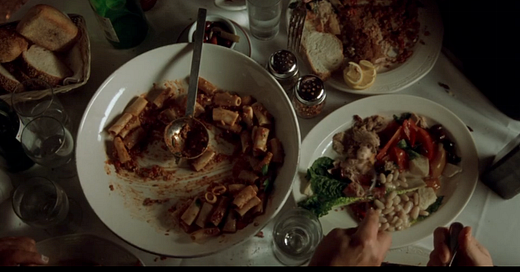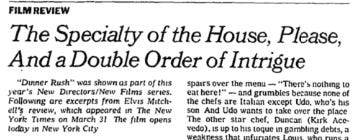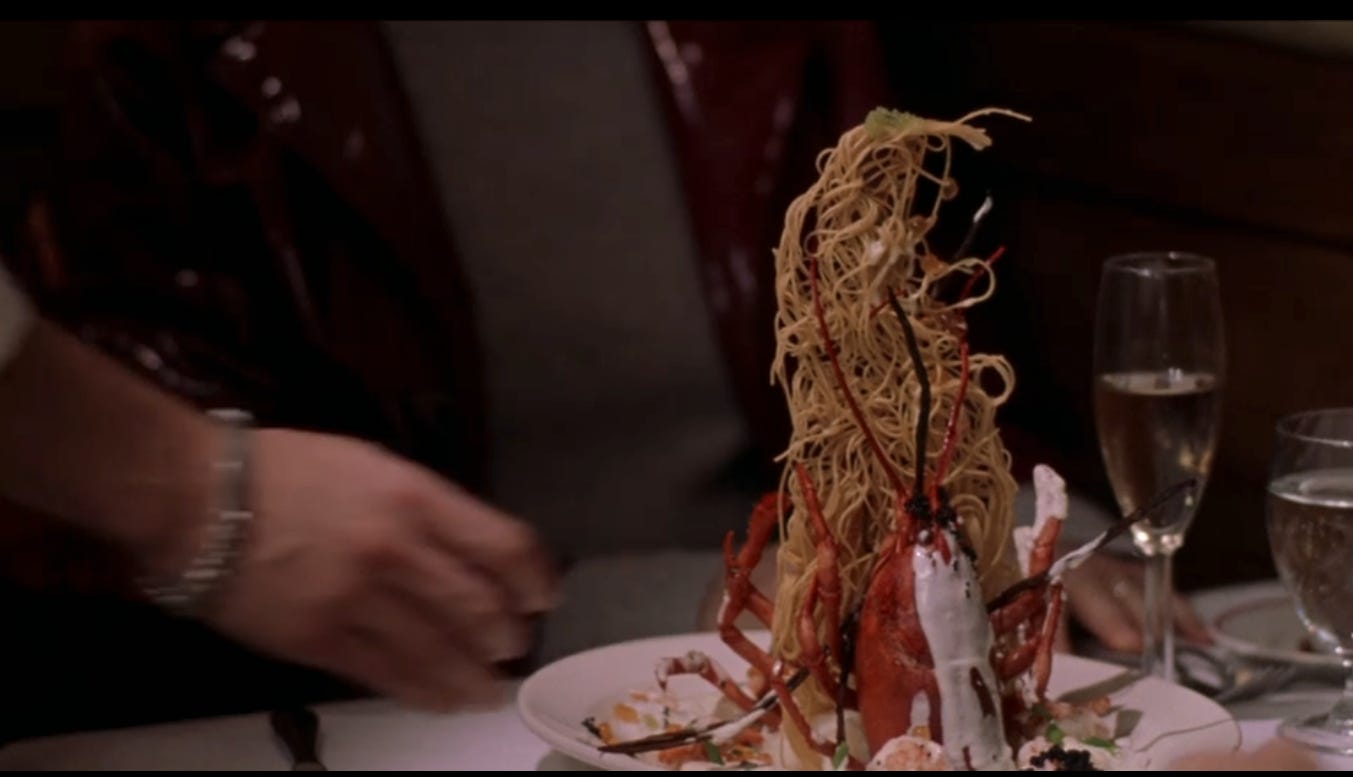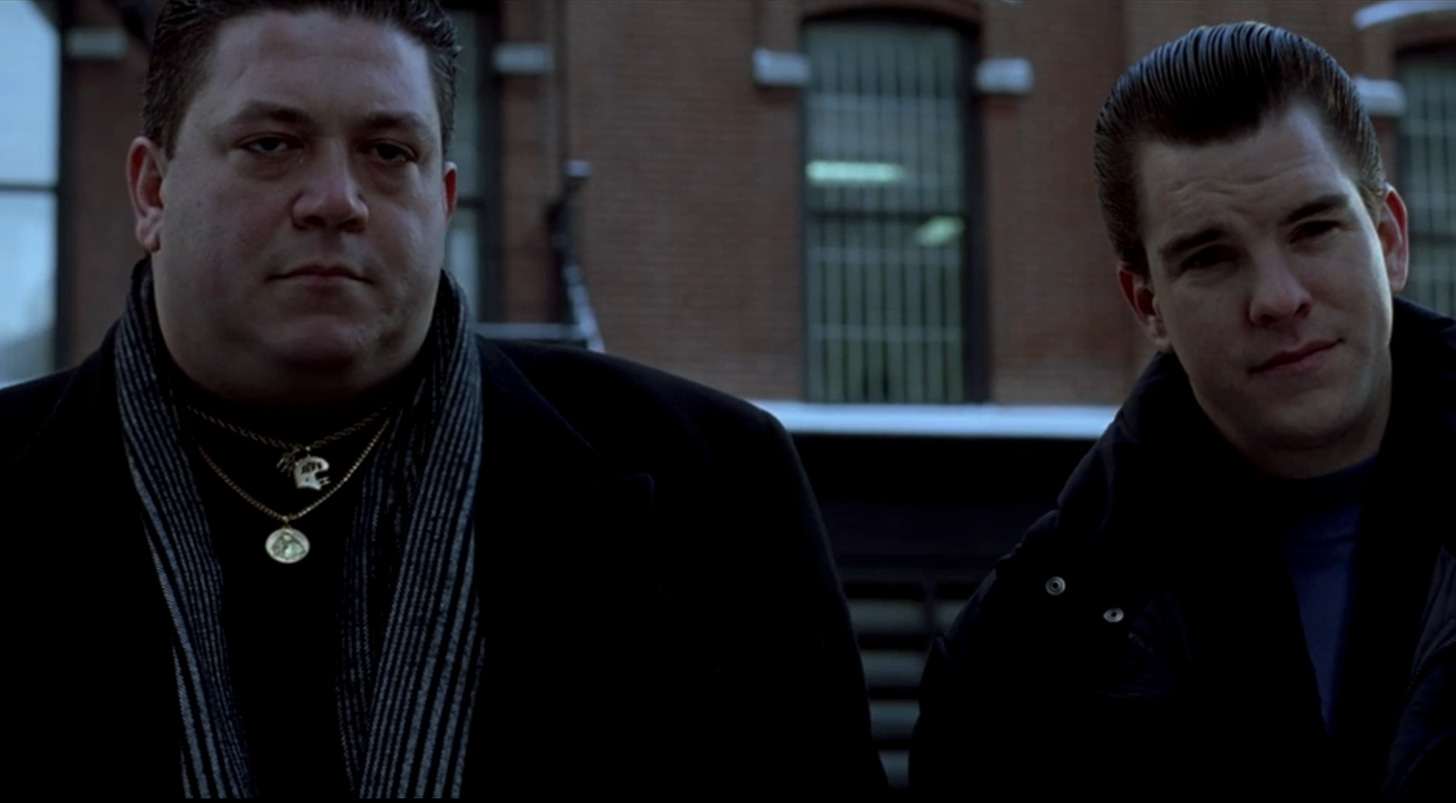I don’t necessarily love the big attention-grabbing headlines, but the other night as I was looking through the endless glut of films I’d marked as wanting to watch, something told me I should finally get around to pressing play on Dinner Rush, the 2001 indie film by Bob Giraldi that stars Danny Aiello in what I came away thinking might be his best role besides Sal in Do The Right Thing. And that something, whatever the hell it was, absolutely had things right. I rarely drop into the I can’t believe I didn’t see this sooner mode since there’s so much stuff out there to watch, but truly, I can’t believe I didn’t see Dinner Rush sooner because it’s the best New York City restaurant movie I’ve ever watched. I finished it and wondered to myself how have I never talked to anybody about this film before. And after a few minutes of searching through the old reviews of Dinner Rush, it started to become obvious. It’s an indie, and the other thing is God-bless the late Mr. Aiello, but he was never the guy who was going to pull in huge bucks at the box office as a leading man. But maybe more than anything, it’s timing.
Dinner Rush was filmed in January and February of 2000. It grossed under a million dollars worldwide at the box office, but I don’t know how much that really mattered. The movie has the true independent feel of a director who just wanted to make the movie he wanted to make and screw what people thought, and that sort of beautiful recklessness feels like such an old concept that you just don’t see anymore. It also feels like one of the last truly great snapshots of what was left of a certain sort of gritty downtown New York City. It takes place in Tribecca, which had been teetering towards full-on gentrification for years by the time the movie was filmed, but it’s still dirty downtown. There’s graffiti everywhere, you see empty storefronts that are likely filled by high-end boutiques or yoga studios today, and the mobsters hanging out down there still have a lot of weight. It’s recognizable today, but maybe not familiar. And that all goes into the timing aspect. You’re literally looking at a “Before” time.
The New York Times review of the film is from September 28th, 2001. I’m not sure what you were doing around that time, but it’s not exactly a period known for people caring much about movies or anything that didn’t involve numbness and overdosing on CNN. And so, it makes sense that an indie film would fall under the radar. The beauty is that all these years later, it provides a fascinating glimpse of the earliest days of new millennium New York City, but it also came out right between Anthony Bourdain publishing Kitchen Confidential and exactly a year before Bourdain’s first show, A Cook's Tour, premiered on the Food Network in 2002. The timing of its release makes Dinner Rush feel like part of a larger narrative that is still being told today with a show like The Bear. Edoardo Ballerini plays the young, hot-shit chef who also happens to be the son of the restaurant owner played by Aiello. There’s this classic struggle between the father and son, with Ballerini’s Udo presenting a trendy menu that feels very quaint and of its time, and Aiello just wanting some sausage and peppers. Instead, Udo does smoked prosciutto with yellow tomato sauce and chickpea fritters and goat cheese with wild mushrooms. When a famous food critic played by the great Sandra Bernhard comes in and wants to be impressed, giving the instruction that something without butter, Udo serves Montauk lobster with rock shrimp standing straight up with some fried pasta reaching to the sky. There’s a Champagne shallot sauce with vanilla bean drizzled around it, and the plate is garnished with salmon caviar, tobiko and chives.
Food-wise, it’s a wonderful snapshot. It’s a look at what was to come, the big restaurant boom of the aughts and 20teens. But there’s something about that specific plate I love because it reminds you of the last time Americans could delude themselves that everything is great and we can be as decadent as we want because the world is our Montauk lobster, baby! And Dinner Rush is a food movie in the most classic sense. The whole thing takes place in a restaurant, save for one scene at the start that puts things in motion for the rest of the film. And while the toxic, macho, dude-centric kitchen and its many problems is a topic that has been about endlessly over the last 20 years, I can’t think of other instances that portrayed it so honestly this early on.
I mention the early days of Bourdain’s stardom because that is an instance reference point in the look, feel and sounds of Dinner Rush. While I love all the Tony shows, there’s something scrappy, low-fi, and looser about those early shows, especially A Cook’s Tour. Tony’s tri-state area accent is really strong, he smokes, he drinks, he kvetches, and he doesn’t have the sort of tools, technology, and bigger budget he had later on when he was the face of CNN. The restaurant in Dinner Rush feels very much like one 2002 Bourdain would have loved…or hated. Who knows? Either way, it feels very of that specific time in a way that’s almost quaint.
There’s a last view of a different time in New York City and a window into the food world of the time, but Dinner Rush doesn’t rest on its nostalgia factor. The way it is shot, the dialogue, and a lot of things don’t feel at all like 2023, but it’s the way the film keeps you engaged all the way through to the climax you likely weren’t expecting at all that feels so unlike anything from our current era. At first, you might think the film isn’t necessarily about any one thing. It’s just a series of looks at the various lives of the people inside a restaurant on a night in 2000 New York City. Everybody is fascinating, from the gambling addict sous-chef to the sweet, little bit naive hostess played by Vivian Wu, the kvetching art critic, and especially the two menacing mobsters who set things in motion at the start of the film, but you really don’t understand how, exactly they do that until the end. It’s one of those films that you realize after you’ve finished it is far more suspenseful than you realized while you were watching it because every scene is so engaging and the pace is perfect.
As I said, I don’t especially like to say something is the “best ever.” But I really thought about it this morning and there are a handful of films that truly do stack up as the all-time great food movies. The one that rightfully comes up the most in that conversation is 1996’s Big Night. And, of course, films centered around stories about Italian Americans have featured some of the most iconic cooking scenes in cinematic history. But the way Bob Giraldi took a restaurant—and not just any restaurant, but Gigino Trattoria, a Tribeca spot the director has owned since 1994—and found a way to present it as this fascinating, self-contained little world filled with all kinds of fascinating people and stories, makes Dinner Rush not only the best New York City restaurant movie ever, but if I ever get around to making a list of my favorite films of this century, I’m putting Giraldi’s movie on it.








